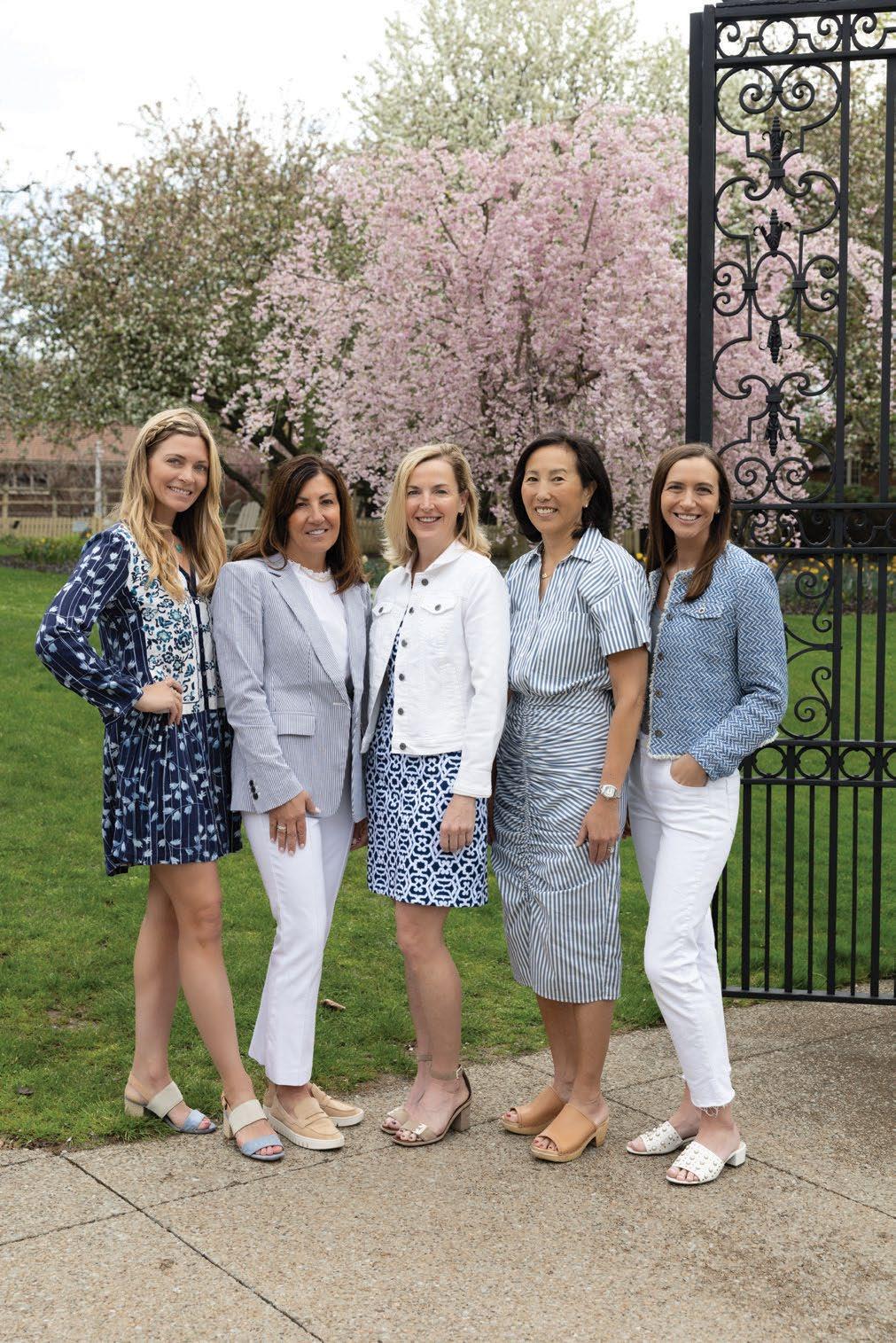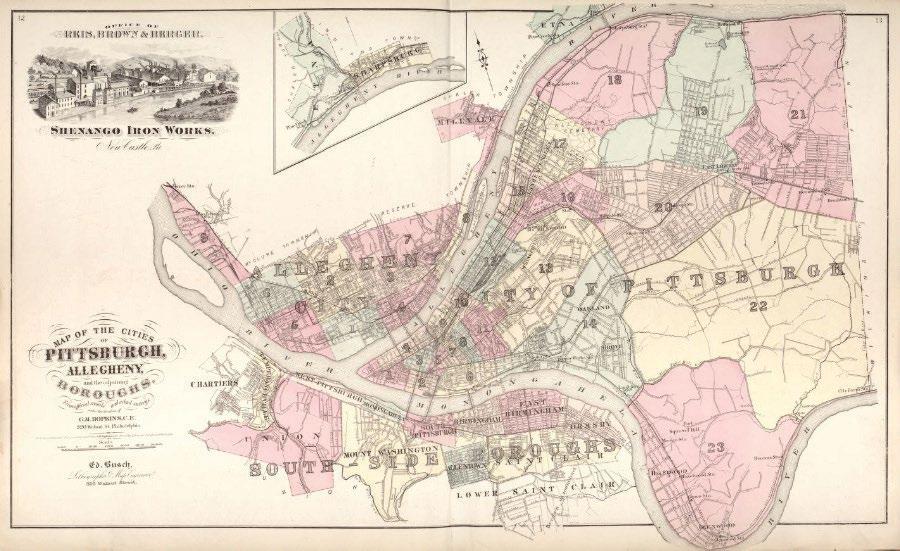
Allegheny County Medical Society


Allegheny County Medical Society
Allegheny County Medical Society
Editorial
• The Wild West
Deval (Reshma) Paranjpe, MD, MBA, FACS
Editorial
• The D-Day Veteran
Richard H. Daffner, MD, FACR
Editorial
• Fatherhood, Sonhood... And Other Incurable Conditions of Mankind
Anthony L. Kovatch, MD
Editorial
• Selling Drugs
Andrea G. Witlin, DO, PhD
ACMS News
• President's Update
Raymond E. Pontzer, MD
ACMS News
• License Renewal
Eileen Taylor
ACMS News
• Call For Nominations
ACMS News
• Notice of Proposed Bylaws Change
ACMS News
• Empowering Women in Healthcare
Anu Anand, MD and Tiffany DuMont, DO
ACMS News
• Specialty Group Updates
ACMS Staff: Nadine Popovich, Eileen Taylor, and Melanie Mayer
ACMS News
• The Return of ACMS Distinguished Awards
Sara C. Hussey, MBA, CAE
Article
• Legislative Update Dan Frankel
Article
• Unlocking the Potential of Medical Clinic Design Alec Templeton

Cover Photo byAlexanndra Kreps, MD Alexanndra Kreps, MD specializes in Child, Adolescent and General Psychiatry Spirit Island, Maligne Lake, Jasper National Park, Canada
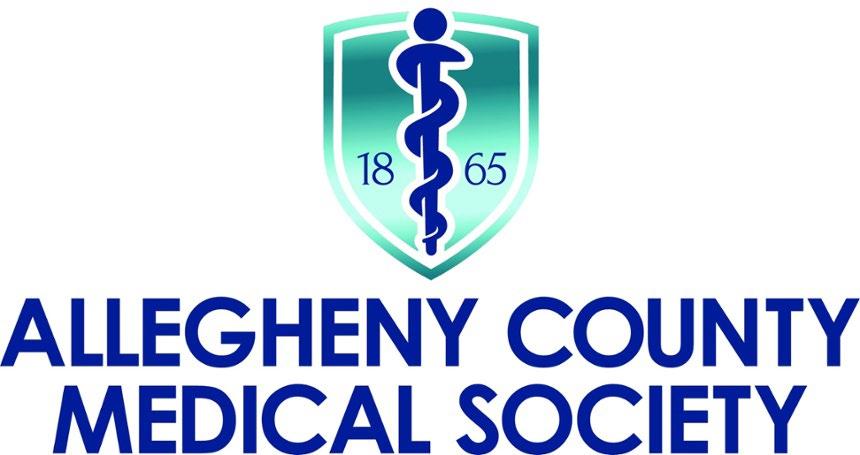
2024
Executive Committee and Board of Directors
President
Raymond E. Pontzer, MD
President-elect
Keith T. Kanel, MD
Secretary
Kirsten D. Lin, MD
Treasurer
William F. Coppula, MD
Board Chair
Matthew B. Straka, MD
Directors
Term Expires 2024
Douglas F. Clough, MD
David J. Deitrick, DO
Jan B. Madison, MD
Raymond J. Pan, MD
G. Alan Yeasted, MD, FACP
Term Expires 2025
Anuradha Anand, MD
Amber Elway, DO
Mark A. Goodman, MD
Elizabeth Ungerman, MD, MS
Alexander Yu, MD
Term Expires 2026
Michael M. Aziz, MD, MPH, FACOG
Michael W. Best, MD
Richard B. Hoffmaster, MD
Micah A. Jacobs, MD, FIDSA
Jody Leonardo, MD
G. Alan Yeasted, MD, FACP
2024 Board Committees
Bylaws
Kirsten D. Lin, MD
Finance
William Coppula, MD
Nominating
Keith T. Kanel, MD
Women’s Committee
Anu Anand, MD & Tiffany DuMont, DO
Managing Editor
Sara C. Hussey, MBA, CAE ACMS Executive Director shussey@acms.org
Medical Editor
Deval (Reshma) Paranjpe, MD reshma_paranjpe@hotmail.com
Bulletin Designer Victoria Gricks victoria@thecorcorancollective.com
Term Ending 2024
Richard Daffner, MD; Anthony Kovatch, MD; Andrea Witlin, DO, PhD
Term Ending 2025
Robert Howland, MD; John Williams, MD; Alexandra Johnston, DO; Charles Mount, MD
Executive Director
Sara Hussey shussey@acms.org
Vice President - Member and Association Services
Nadine M. Popovich npopovich@acms.org
Manager - Member and Association Services
Eileen Taylor etaylor@acms.org
Operations CoordinatorACMS & ACMS Foundation Melanie Mayer mmayer@acms.org
Part-Time Controller Elizabeth Yurkovich eyurkovich@acms.org
Bulletin Designer Victoria Gricks victoria@thecorcorancollective.com
EDITORIAL/ADVERTISING
OFFICES: Bulletin of the Allegheny County Medical Society, 850 Ridge Avenue, Pittsburgh, PA 15212; (412) 321-5030; fax (412) 321-5323.
USPS #072920. PUBLISHER: Allegheny County Medical Society at above address.
The Bulletin of the Allegheny County Medical Society is presented as a report in accordance with ACMS Bylaws.
The Bulletin of the Allegheny County Medical Society welcomes contributions from readers, physicians, medical students, members of allied professions, spouses, etc. Items may be letters, informal clinical reports, editorials, or articles. Contributions are received with the understanding that they are not under simultaneous consideration by another publication.
Issued the third Saturday of each month. Deadline for submission of copy is the SECOND Monday preceding publication date. Periodical postage paid at Pittsburgh, PA.
Bulletin of the Allegheny County Medical Society reserves the right to edit all reader contributions for brevity, clarity and length as well as to reject any subject material submitted.
The opinions expressed in the Editorials and other opinion pieces are those of the writer and do not necessarily reflect the official policy of the Allegheny County Medical Society, the institution with which the author is affiliated, or the opinion of the Editorial Board. Advertisements do not imply sponsorship by or endorsement of the ACMS, except where noted.
Publisher reserves the right to exclude any advertisement which in its opinion does not conform to the standards of the publication. The acceptance of advertising in this publication in no way constitutes approval or endorsement of products or services by the Allegheny County Medical Society of any company or its products.
Annual subscriptions: $60
Advertising rates and information available by calling (412) 321-5030 or online at www.acms.org.
COPYRIGHT 2024: ALLEGHENY COUNTY MEDICAL SOCIETY POSTMASTER—Send address changes to: Bulletin of the Allegheny County Medical Society, 850 Ridge Avenue, Pittsburgh, PA 15212. ISSN: 0098-3772
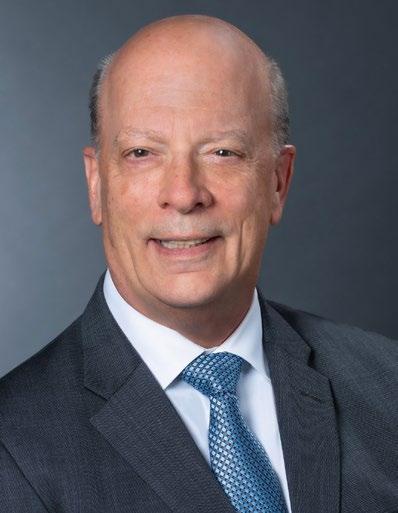
Here at ACMS, we have had a fastmoving and productive 2024. The leadership and administrative staff continue to strive to meet our mission goals – improving healthcare through education, advocacy, service, and physician well-being. With regards to the latter, physician well-being, we have made great strides getting the ACMS Physician Wellness Program up and running. The Centers for Disease Control indicate that half of U.S. physicians report feeling burned out. Dr. Vivek Murthy, US Surgeon General, recently stated that “addressing burnout must be a top national priority.” I personally have witnessed friends and colleagues suffer under the ever-increasing stress that our work can exert upon us. Sadly, a few that I have known have succumbed to this pressure.
The staff here at ACMS, under the leadership of Dr. Vint Blackburn, have worked diligently to establish our Physician Wellness Program. We have recruited mental health providers familiar with the problems facing physicians. Our program provides confidential counseling services that are tailored to the unique needs of physicians living and working in Allegheny County. It is supported by the Physicians Foundation and the Allegheny County Medical Society Foundation and made available to both member and nonmember physicians. For further information regarding this program, I suggest that you visit our website acms.org.
Another initiative this year is to enhance the advocacy portion of our mission. Guests at our board
meetings earlier this year have included ACMS member and Pennsylvania representative Dr. Arvind Venkat as well as the PAMED lobbying team of Zac Gates and Dave Thompson. These gentlemen gave their perspective of ongoing legislation in the state legislature that is of import to the medical community. The ACMS leadership and administrative team strive to keep our members in the know regarding ongoing legislation. One recent bill cosponsored by Dr. Venkat in the PA legislature is House Bill 1163, which essentially would repeal ‘non-compete’ contract restrictions for nonprofit organizations. As this bill has important implications for the many employed physicians in our community, ACMS made certain to alert our members at the time of the vote in the house, which passed the bill. It now moves onto the PA Senate. Dr. Venkat, as well as Mr. Gates and Mr. Thompson, strongly encouraged us as members to personally contact our respective state senators to let them know how you stand on passage of this bill.
I want to personally thank those of you who attended the ACMS Honors Event in April. The ACMS staff did an outstanding job putting this event together. We were joined by many members of the nonprofit charitable organizations who benefit from ACMS Foundation grants. It is heartwarming to hear their stories and how they apply the monies received to further the social and medical wellbeing of our region. Also we honored several physicians who received the “40 Under 40” award. I was personally encouraged to see these young talented individuals
ready to carry on the vocation providing excellent health care in our community. Also at the event, Dr. Vint Blackburn introduced the establishment of the ACMS Physician Wellness program.
Here at ACMS, we look forward to the remainder of this year with excitement and anticipation. I want to thank Drs. Anu Anand and Tiffany DuMont for taking the lead on our Women in Healthcare Committee. There is much interest in this initiative with strong attendance at their recent events. A summer social is scheduled for August 22 and will feature Dr. Kristen Sandel, President Pennsylvania Medical Society. Another fun event this summer is ACMS Night at the Pirates Game on August 24. It was sold out last year and should be a good time for members and their family, especially since it is a Fireworks Night. Finally, make plans to attend the ACMS Annual Meeting and Awards event planned for November 13. Please see the ACMS website for more information regarding these events (acms.org).
Thanks again to all of you for your continued support. Don’t forget to contact your state senator regarding the pending vote on abolishing non-compete clauses for nonprofit organization employees. Wishing you all a pleasant and productive summer.

Lately, I wake up at 3 am for no good reason and fall asleep again in an hour if I’m lucky. Many of my contemporaries have the same problem, but will rarely talk about it unless asked. What do we do in the wee small hours of the morning? Everyone seems to reach for their smartphone.
I check the news on various local and national apps, check email, and only once I’ve run out of serious things to read, I’ll scroll through Facebook or Instagram to catch up on friends, their kids, and the misadventures of various cats and Pedro the dancing racoon. (This refers to a current onslaught of viral videos featuring a baby racoon dancing to a techno remix of Raffaela Carra’s 1980 Italian disco hit “Pedro”. If you’re up at 3 am try it. You won’t be sorry.)
Facebook and Instagram advertisements are targeted to your particular interests and demographics. I am being targeted by makeup and skincare companies among others. Recently, an ad for a different sort of skincare company popped up: Musely. Musely is an online medical service that offers compounded topical and oral prescription medications ranging from hair growth formulas to facial hair reducers to anti-aging facial creams, rosacea treatments and hormone replacement therapy (at least in cream form).
It's easy to order a Musely product— just answer a few medical questions and upload a few pictures of your face (or hair, or nails). You pay a fee (discount for auto-refill) and a $20 MD consultation fee. One of the dermatologists-in-a-box will approve
you for the compounded formula that makes the most sense, and it’s shipped to your door in a pretty dusty rose box.
Of course there’s an app, a loyalty program, and referral bonuses if you reel in friends.
On one hand, this is tremendously liberating for the average person. Ready access to prescription grade solutions for everyday problems in an app on your smartphone or at the touch of your keyboard. And in the privacy of your own home, with no waiting for months to see a dermatologist! It’s all cash pay, and you can bypass the headache of insurance and costly Big Pharma drug prices. Musely has just reached 800,000 patients and counting. Small wonder.
On the other hand, this online pharmaceutical Eden may hide an unintended snake or two.
Musely’s formulas are titled with generic names like “The Spot Pill” or “Estrogen Boost” or “Anti-Aging Cream”, and the composition of each can be wildly different—the only way to know for sure what you’re taking is to check the compounding label or the order on the website.
There is no physical exam before dispensing; not even a telemedicine video consultation.
Questions abound. Can this really be construed as a physician-patient relationship? What kind of malpractice coverage do these doctors have? How well do they sleep at night?
Patients could always lie about their medical history to get what they want online just as in a face-to-face visit if they really wanted to, but it’s much easier when hiding behind a computer screen. Every patient is a new patient
with no prior history. And just like that, for a fee, the average Joe, Jo or Josephine has access to things like hormone therapy, and oral tranexamic acid.
Patients may or may not understand the gravity of the potential side effects that could occur with some ingredients. Topical tranexamic acid is used to stop bleeding by causing clotting. The oral version carries risks of systemic clotting, which could lead to stroke, MI or PE. But a certain segment of women desperate to look “lighter” because certain cultures prize fair skin in women as beautiful will not care about the risks or may misstate their histories in order to obtain a prescription.
Systemic HRT carries potential risks of clotting related complications and malignancy. There is no room for a conversation about risks and benefits on an online platform between physician and patient that takes a few minutes, and no follow-up visits. There is a 60 day e-nurse service, but how many patients will choose to follow up like this in this busy day and age?
Far down in the fine print of the generic booklet that comes with the product is the advice to let your regular physician know that you are taking Musely medication and what it contains.
But the far more likely scenario is that your patients may never tell you what they are taking from an online service, and may not think of it as real medication because it didn’t come from a doctor they saw in “real life” or a regular pharmacy. If they do, they may just say “it’s called “The Spot Pill” but I don’t know what’s in it, and the label has continued on page 6
worn off”. They may not even remember the name of the online service. You will be in the dark.
Please be on the alert—skin care is just the tip of the iceberg. Men of all ages may be reticent to admit that they are taking testosterone supplements or steroid injections obtained online. Viagra, Cialis and similar agents can also be obtained in the same way and
Skincare
Musely -- www.musely.com
Ro -- www.ro.com
may go unmentioned. Gender-affirming hormone therapy is similarly available online at various sites.
And we haven’t even explored the wild world of Ozempic analogs available online, some of them scams.
Make sure you ask your patients if they are taking any medications from online pharmacies, and educate yourself on what’s out there. Browse
Apostrophe -- www.apostrophe.com
Semaglutide/Ozempic/Wegovy/ Zepbound/Mounjaro
BrightMeds — www.brightmeds.com
Ro — www.ro.co
Alanmeds — www.alanmeds.com (compounded)
AgelessRx — www.agelessrx.com
Henry Meds — www.henrymeds.com
Zealthy — try.getzealthy.com
Everlywell — www.everlywell.com
Transgender/Gender-Affirming Hormone Therapy
Folx Health — www.folxhealth.com
Circle Medical — www.circlemedical.com
Plume Health — www.getplume.co
True U — www.trueuclinic.com
QueerDoc — www.queerdoc.com
GenderGP — www.gendergp.com
below and you will be amazed at the extent and ease of prescription meds available. It is indeed the new Wild West.
Below are some other online companies which offer prescription medications. The following list is a sampling, does not imply my or ACMS endorsement and is only for informational purposes.
Hormone Therapy (menopause)
Alloy Health — www.myalloy.com
Winona — www.bywinona.com
Pandia Health — www.pandiahealth.com
Defy — www.defymedical.com
Thrivelab — www.thrivelab.com
Evernow — www.evernow.com
Everlywell — www.everlywell.com
The Riegel Center — www.theriegelcenter.com
HerKare — www.herkare.com
Circle Medical — www.circlemedical.com
Renew Youth — www.renewyouth.com
Hormone Therapy (testosterone) and Cialis/Viagra
Regenx Health — www.regenxhealth.com
Henry Meds — www.henrymeds.com
Defy Medical — www.defymedical.com
Maximus — www.maximustribe.com
Blokes — www.blokes.co
TRT Nation — www.trtnation.com
Hims — www.hims.com
Ro — www.ro.com
Ziphealth — www.ziphealth.com
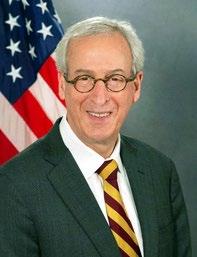
When the Federal Trade Commission issued a rule this year banning most restrictive covenants in employment contracts, Pennsylvania’s workers rejoiced.
Increasingly, employers have used so-called “non-competes,” not to protect intellectual property as they were intended, but rather to stymie healthy competition or trap employees whose careers might take them elsewhere.
The FTC rule was an acknowledgement that regulation of the clauses was badly needed, but it could only go so far. While private practices and for-profit hospitals and healthcare providers will be blocked from enforcing non-compete agreements, many of our largest healthcare employers are excluded from the rule.
Fortunately, just days prior to the FTC announcement, my legislation to keep restrictive covenants out of the employment contracts of most health care workers (HB 1633) passed the Pennsylvania House of Representatives.
I began work on this issue more than a decade ago, during the dramatic face-off between Highmark and UPMC that began in 2011 and lasted until then Attorney General, now Governor Shapiro, stepped in in 2019. That bruising battle left patients terrified of losing their doctors, and providers afraid to speak out for fear of losing their jobs.
I personally received phone calls and emails with stories of doctors being forced to leave Pennsylvania and work in Ohio and West Virginia, because their non-compete clauses were so strict they couldn’t stay in the
commonwealth. Non-competes are already unenforceable, prohibited, or limited in 22 states: NH, MA, RI, CT, DE, WV, IN, TN, FL, AL, LO, TX, NM, OK, CO, SD, ND, UT, ID, OR, WA, CA.
As we look ahead to an anticipated nationwide physician shortage, we should be seeking out ways to attract and keep medical personnel — not forcing them to sign contracts that will limit their options.
Because these contracts are private, we can’t look at them, but I’ve heard stories of geographic limits of 75 miles from any location in the employer’s health system. For a doctor working in one of the large health systems in Allegheny County, like UPMC or Allegheny Health Network, that could prevent them from setting up shop in large swaths of the commonwealth.
Proponents of noncompete clauses argue that doctors and nurses who don’t want them in their contracts should say so when they negotiate the terms of their new employment. But in reality, this binding language is a take-it-orleave-it proposition, typically presented after salary and benefit negotiations. A newly minted doctor, physician assistant, or nurse has much less leverage than an employer demanding a non-compete as part of hiring.
While current law does require restrictive covenants to be “reasonable,” that would only help healthcare workers who have the resources to bring suit and win against massive healthcare systems with legal departments. Who is more able to hire high-priced lawyers and wait out a several years court battle, a hospital system? Or a nurse practitioner?
Even if a worker did bring suit, courts are allowed to only strike the most egregious parts of the contract, leaving the rest of it intact. So, a worker can make it all the way to court and only have part of their non-compete struck down. This system gives health care employers every incentive to attempt the most expansive noncompete possible.
The Allegheny County Medical Society has been a critical voice during this effort. Physicians came to Harrisburg to speak before the committee on the role noncompetes played in limiting access to providers, and supported the efforts organizationally – through formal letters of support, as well as with calls to Representatives.
The efforts paid off.
Finally this year my bill cleared the House Health Committee and passed the entire House, with a vote of 150 to 50. The entire Allegheny County delegation voted for it, with the exception of one representative.
Like everyone else, physicians and nurses build careers with the expectation that their professional paths may take them through multiple opportunities over the years. But every new job shouldn’t have to mean selling your home and changing your children’s schools.
Now House Bill 1633 sits in the House Health and Human Services Committee awaiting a vote. Senator Brooks is mindful of the issues facing providers, and I’m hopeful that she’ll bring the legislation up for a vote.
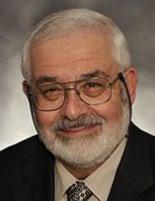
June 6, 2024, marks the 80th anniversary of the D-Day invasion of Normandy. This invasion marked the beginning of the end of Adolph Hitler’s Third Reich. This editorial is dedicated to the men and women involved in that event, many of whom lost their lives that day. Most of those who survived the landing are no longer with us. While attending a radiology meeting in New Orleans in 2002, I took a break to visit the D-Day Museum. The museum had been established two years earlier (June 6, 2000) on the 56th anniversary of the D-Day invasion of Normandy. New Orleans was chosen as the site for the new museum for several reasons. First, the Higgins boats that were vital to the amphibious landings at Normandy and in the Pacific theater of war were designed, built, and tested in New Orleans by Higgins Industries. In addition, New Orleans was the home of military historian and author Stephen Ambrose ("Band of Brothers"). Although the museum was founded in 2000, it was later designated by the U.S, Congress as America's official National World War II Museum in 2004.
The day I visited the museum there was a sparse crowd. And it was there that I met John, a World War II veteran, who, I would shortly learn, had participated in the D-Day landing. John and his wife we're carefully looking at the various artifacts and photographs of the Normandy landing when suddenly John let out a loud exclamation, "Holy s—t!, That’s me on the beach!" When I heard John cry out, I went over to look at the photograph that he and his wife were staring at. The photo was of a young man, more a youth than an adult
picking up a helmet and a rifle that had been dropped by another soldier who had been killed minutes earlier on the sandy beach. I estimated John to be in his late 70s. However, despite the effects of time, I could still recognize his features on the young man in the photograph. I went over and introduced myself, telling John that I was an Air Force veteran from the Vietnam era. And I wanted to thank him for his service.
When watching archival film footage of the Normandy invasion and seeing the carnage on the young men who landed that day, I had often been curious about what motivated these individual to be willing to sacrifice themselves in such an endeavor. I said to John, "Sir, I know you have been asked this many times. 'How did you and your buddies motivate yourselves to face the possibility of imminent death?'"
John paused for a moment, and then he said, "Well, unlike the Vietnam War of your service time, it was very clear what the issues were. We knew who the 'bad guys' were, and we knew what the stakes were if Germany and Japan had won the war. Besides, we were just a bunch of kids. I was a 19 year-old farm boy from Iowa at the time and I enlisted a year earlier. None of the guys in my platoon thought they were going to die that day. That was going to happen to somebody else. By the way, did you see the movie 'Saving Private Ryan'?"
"Yes," I said.
"Well, remember the scene where Tom Hanks is in the landing craft. I am alive today because I was in the very back of that Higgins boat. When the ramp went down as we came ashore,
the German machine guns opened fire and killed all the men in the front of the craft. I dropped everything I was carrying – pack, rifle, and helmet - and went over the side into the water. As I struggled to shore, bullets were raining down in the water around me, just like it was portrayed in the movie. Somehow, I made it to shore and was able to obtain a new helmet and rifle from one of the fallen soldiers who had been killed on the beach. I was fortunate in that I never suffered as much as a scratch through that campaign and those that followed, right up until when we marched into Germany a year later. I lost a lot of buddies that day. I'm convinced the good Lord took kindly to me that day." The official record listed 2,501 Americans who died that day; around twice that number were wounded. Once again, I thanked him for his service, and I apologize if my questioning had brought back painful memories. He told me that war memories were just some things that he had to deal with. He even told me that he had considered not seeing the "Ryan" movie, fearing it would trigger unpleasant memories. However, he decided he had to watch the movie to see how accurately the events on that day had been portrayed. In his opinion, they had. (Director Steven Spielberg had interviewed veterans for their input.)
John was a member of what has been called the Greatest Generation, the group of Americans who were born between 1901 and 1924. They came of age during the Great Depression and many of them fought and died in World War II. The name was first used in 1953
by former U.S. Army general James Van Fleet who, when speaking to Congress said, "The men of the Eighth Army are a magnificent lot and I have always said the greatest generation of Americans we have ever produced." The term was popularized by journalist Tom Brokaw in his 1998 book of the same title. Brokaw noted that those men fought not for fame or recognition but did so because it was "the right thing to do." The Greatest Generation is estimated to have had 63 million people. Of the 16 million Americans who fought in World War II, approximately 167,000 were still alive in 2022. Their numbers are rapidly diminishing.
When the Japanese bombed Pearl Harbor on December 7th, 1941, there
was a rush of men and some women to join the military. My father, a pharmacist, who was born in 1906, was disappointed when he went to the recruiting office and was told that he was too old, at age 36, to join. Instead, he enlisted as a medic in the New York State National Guard, where the only "action" he saw was the "Second Battle of Saratoga" – a military exercise.
The veterans of World War II and Korea were hailed as heroes for "making the world safe for democracy." This was not the case for those of us who served during the Viet Nam war. Fortunately, this is not the case for those men and women who served in Iraq and Afghanistan. Now, all our veterans are honored for their service to our country.
Dr. Daffner is a retired radiologist, who practiced at Allegheny General Hospital for over 30 years. He is an amateur historian.


Whether you are opening a new medical practice or considering refreshing your current clinical space, the integral role that design can play in the holistic approach to health and wellness settings should always be considered. Simple, thoughtful design strategies are key to delivering a welcoming clinical environment where the paths to healing can be nurtured.
Patient-centered medicine places the patient first and improves their health outcome through devoted and compassionate care by the vast network of highly skilled practitioners and staff that make it possible. This maintenance of health has as its complementary backdrop the array of clinical spaces in hospital and outpatient settings that facilitate these essential interactions. Together, these interpersonal and spatial relationships define much of the patient’s experience within a clinical setting and ultimately impact their health, both directly and indirectly.
While the practice of medicine is often defined as one of service, it is also importantly one of hospitality. “Service is black and white; hospitality is color”1 summarizes the often-paraphrased belief that it is the way you make people feel that will be remembered, less what you do or say. When this feeling is delivered with sincerity, a little goes a long way. Just as a plainly designed space can functionally serve its intended purpose, a carefully curated and unique approach to the same space can bring it to life with a much richer and memorable experience for all. This intentionality helps set the stage for this duality of service and hospitality
that are instrumental in the success of any medical practice.
It is important to stress how the visual aesthetics, layout and culture of the clinical environment you create have a lasting influence on the patient’s overall healthcare journey. Visiting a medical facility can be a stressful event for patients, often attributed to the anxieties associated with the (unknown) condition of their health. Faced with an unwelcoming or sterile environment, those feelings can often heighten, negatively affecting a patient’s wellbeing and even discouraging regular follow-up visits in the future. For most of us, our home provides us with the greatest sense of security, comfort and pride. Translating that sense of “home” to a warm and inviting clinical setting taps into those same sentiments to build an atmosphere of collaboration and trust. Intentional design decisions can deliver an inviting clinical space but more importantly also help promote feelings of empathy and confidence in one another.
Whether it is architectural, graphics, industrial or another, much of the world we live in and interact with is designed to a degree. These designed elements help shape the way we engage with space, with one another and ultimately influence the way we feel. Successful clinic design incorporates many elements and layers of inspiration, but always consists of a clearly defined approach and set of goals that strike a balance between operational requirements and an enriched patient experience. With many considerations required to achieve a successful space, several strategies to focus on during
the conceptualization and delivery process are highlighted below.
Designing your clinic from an empathetic perspective will help you understand how your patients feel and experience the space. Making informed and strategic decisions to create a healing environment that caters to their needs and comforts will positively influence their feelings and their engagement with your team.
Curate the “Hello”
The waiting area that greets patients upon entry is one of the most critical components in any clinical layout. First impressions are everything. The visceral response one has to the space when entering and the personal interaction with the public “face” of the practice at the front desk set the tone for the entire visit. This area should be both spacious and intimate, functional and personable, and undoubtedly prioritizes the patient. Creating a clear sightline from the front desk to the front door, providing comfortable and varied seating options, generous refreshments and small personalized touches go a long way in creating an inviting atmosphere that exudes hospitality, calmness and professionalism.
A carefully planned layout with efficient adjacencies and a natural flow for both patients and staff to seamlessly choreograph is vital to the performance of a medical practice. The patient’s path from entry to exit, as well as the staff’s ability to efficiently service the needs of the patient and practice, rely on a well-thought-out
plan. Whether it is streamlining checkin and check-out, utilizing inclusive technology, implementing a central nurse station, minimizing wasted space and redundancies to defining some separation between clinical and support, the optimal flow will provide the best results.
Your design aesthetic should complement your brand, mission, values and the hospitality you strive to deliver. Clearly defined color palettes, strategic branding integration, playful design elements, accent lighting and beyond, all collectively harmonize to make your unique space your own and reaffirm your practice identity. For example, when clinical spaces do not have the luxury of natural light, it is important to find new ways to brighten and accentuate spaces and create visual intrigue. Similarly, your design palette should continue holistically through exam rooms and support spaces. This consistency in aesthetic and implementation is important, whether you have one clinical space or multiple. A beautiful office space is certainly impactful on your patients, but in some ways even more important
for your team. This resultant pride in their workplace pays dividends towards the culture and morale of the practice and very possibly encourages more attentive care and concern.
The goal in layering your space is to deinstitutionalize and soften your clinical environment in a way that balances functionality and warmth to create a welcoming and comfortable atmosphere for your patients. Creating opportunities to introduce layers of biophilic elements such as plants and natural materials, tactile touchpoints, uplifting art, effective signage and inspiring reading materials will truly set the tone for your space. When layering, it is best practice to subscribe to the mantra of “less is more,” as simplicity and restraint can often be more powerful than overly complex and additive.
The work does not stop when the project is complete and occupied. Allowing the practice to continually evolve is a healthy approach for the future. Maintaining your space through regular cleaning, organizing, updating, adapting and repairing are all necessary


measures for the sustainability of the practice. It is all too easy to let a clinical space become stale and go to the wayside, but dedicated measures over time will only help to ensure the practice’s productivity, reputation and success for years to come.
While the true measure of success of a medical practice relies on the skill and care provided by its personnel, careful attention paid to thoughtful, efficient and progressive clinic design can bolster the level of service and hospitality provided for the community. Being considerate and intentional in your space and mindset will set your practice up for success.
1. Will Guidara, Unreasonable Hospitality: The Remarkable Power of Giving People More Than They Expect
Alec Templeton is a licensed architect and the principal of Aktelier LLC, an architectural design consultancy firm in Pittsburgh.


“Life can only be understood backwards; but it must be lived forward.”
Soren Kierkegard, Danish philosopher and founding father of Existentialism (another incurable condition of mankind)

Long ago, it must be/I have a photograph/ Preserve your memories/They’re all that’s left you” from “Bookends” by Simon and Garfunkel
The statistics quoting the average longevity of men and women from varying cultures, races, socioeconomic strata, and geographic areas are “all over the page”! In 2023, the average lifespan of denizens of planet Earth was 73.4 years—ranging from a high of 85.8 years in Hong Kong to a low of 53.7 years in Chad. While over the past several decades the global figure has fluctuated with the tides
of many contributing factors (Is not every consequence in medicine multifactorial?), one rule remains ironclad: women outlive men by about 5 years - 76 years strong versus 70.8 years. This disparity between the sexes breeds true even in the animal species that reproduce!
Hypotheses regarding this consistent differential abound and tend to be well-supported by science. In recent years, research has focused on the theory that as human cells become “senescent,” those of males lose the sex-related Y-chromosome, making their carriers more prone to heart scarring due to cardiovascular disease and resultant heart failure. This Y-chromosomal attrition has its onset in men over 60 years of age— especially in smokers and in those who will suffer from Alzheimer’s Disease. It is hoped that the anti-inflammatory drug pirfenidone—used to treat idiopathic pulmonary fibrosis—may help counteract the harmful effects of this chromosomal loss; in vitro and animal studies are in progress.
Another increasingly notable factor in Americans’ shrinking lifespan is the proliferation of the so-called “deaths of despair.” That’s a nod to the increasing prevalence of deaths owing to such causes as suicide, drug use disorders, alcoholic liver disease, and morbid obesity. These are often linked to economic deprivation, compromised mental health, and overwhelming stress—especially due to the loss of a loved one. I personally hypothesize that fathers who have only sons are at a heightened risk, as these men are never free from the chains of
subconscious role-modelling. Men with only daughters tend to suffer no ambivalence about appropriate displays of love and affection, and, furthermore, no bonds can be fractured through failure to live up to high expectations or through failed reciprocations. When interactions tend to be unconditional, it is far easier to understand everything forward.
Psychologists and existentialists claim that the paramount way to avoid the “maladaptive coping” following overwhelming loss that leads to active or passive suicide (“suicide by omission”) is to memorialize the loved one. Now 55 years later, I realize how my father tried to do this with a wrist watch on the night of my high school graduation. I can do nothing more now that to pay it forward.
My old man, after whom I was named, was fondly called “Rocky” by his friends at work only—for us Baby Boomer offspring, even “Daddy” or “Mommy” was pushing it. Born very late in the reproductive lives of Hungarian immigrants, this short (maybe 5 foot 4 inch), humble, all-giving man grew up fatherless as his old man suffered brain damage from “too many years of working and slaving deep in the coal mines” of Northeastern Pennsylvania. Therefore, he fathered his two sons by the seat of his pants, rather than by referencing a “user’s manual from his memory” like the rest of us.
The buses that night in 1955 were too crowded and many folks were forced to either forego watching the Fourth of July fireworks or view them at a distance from the rooftops of their dilapidating
apartment buildings in old Passaic, NJ. After the toddler brother was put to bed, the man Rocky, either by design or by fortuitous discovery, escorted his distraught, tearful four-year-old son through a secret passageway to the roof where they silently enjoyed the fireworks together, isolated from the rest of humanity “far from the madding crowd.” The scared little lad believed that not even Mommy was aware of their secret.
Rocky held his son tightly in his arms on the parapet of the dusty roof and not one exploding firework muted the steadiness of his smile. The young boy would later understand backward that in that silence (only broken by the far-off blasts) love would never run deeper, and that never again would everything be so right with the world!
Nowadays, sociologists and psychologists pose the question: Do our children lead better lives than we, their parents, did as children? Or any of their ancestors did as children? Of course, our children suffer less fear of serious medical illnesses and enjoy the comforts afforded by technology. But do their parents love them more than our parents loved us? Can anybody truly define concepts such as love, happiness, fear, quality of life? I cannot.
If he had not been a young teenager, the insult wouldn't have been so searing. His younger brother had offered him a religious article, a set of rosary beads, as a birthday gift. Thinking that religiosity was beneath the “coolness” of a teenager, he refused the gift. When apprised of the incident that evening, the bone-weary, preoccupied Rocky fiercely slapped the “cool jerk” teenager across the face and barked like a pit bull: “I never thought any son of mine would refuse a gift from his brother!” The crestfallen boy cried it off and the affront was soon forgotten by father and son. I would only understand it later. There were far more important considerations at hand: Mommy was dying.
Is it not preferable in the grand scheme of things to cure the father-son
dilemma by “skipping a generation”? To be blessed only with grandsons or great-grandsons? This arrangement will eliminate the conundrum which arises when the timeless question (first posed by Cain and Abel, no doubt) is directly or tacitly addressed to the unsuspecting patriarch: Who is your favorite?
I fortunately was bailed out in this matter by the wisdom of my fatherin-law Jack—father to 12 children, 8 of them boys. The response was simple but achieved a temporary truce—or at least took the heat out of a hot kitchen: “You are ONE of my favorites.” However, by the time my own children had passed home economics and psychology in high school, the ambiguity of the clever response made it nothing more than a temporary diversion.
“All graduates, stand up, turn around, and give a big ovation to the persons who got you here today YOUR PARENTS!” remarked the high school principal with the assertion of a cheerleader. I went through the motions but knew that I was only faking it. Only my father and brother were there for me, and my heart was heavy from incomplete grieving and maladaptive coping. Mommy had suffered the ravages of Huntington’s Disease for nearly a dozen years now, had been institutionalized, and was becoming more and more of a distant memory. My depression deepened as we interrupted the long, lonely ride home to “pick up something at a restaurant.”
YES, they were all there waiting for me every freakin’ relative Rocky could convince to travel to New Jersey from within a 500 mile radius. It felt to me that more folks were in the party room than were enclosed in the entire auditorium one hour before. To this day I cannot imagine how he pulled it off. I was “King for a day,” or at least for that one Friday evening. However, I eventually had to summon great inner strength to fight off the tears inside. It was June 19, 1969 and the inscription on the underside of the gifted watch read: Love, Mommy and Daddy.
All of which goes to disprove the popular modern-day hypothesis that the father has to be the “fun parent.” I think Rocky knew that parents are virtually inseparable and that Mommy is always the favorite! I think a father’s sacred obligation is to illustrate beyond a doubt to sons and daughters the eternal beauty of life on this earth and how to navigate its changing tides for better or worse, as he had previously promised to their mother. Always a giant, Rocky died of a “broken heart” at the young age of 53 from extreme self-sacrifice and self-neglect—“suicide by omission” as we would call it today. With today’s awareness of the cruciality of men’s health, I am convinced it could have been avoidable.
Sons, in particular, must stand on the shoulders of the giants, memorialize their parents (as I have finally strove to do so here 50 years too late), and try to understand life forward in all its idiocy, inscrutability, and profundity, sorting through the illusions.
"Well something’s lost, but something’s gained in living every day I’ve looked at life from both sides now/From win and lose and still somehow
It’s life’s illusions I recall/I really don’t know life at all."
from “Both Sides, Now” by Joni Mitchell
Happy Father’s Day to All--Both the Living and the Dead!!

www.acms.org/nominations/
Join the Board of Directors & ACMS House of Delegates! Nominations are due by: July 15, 2024.
The ACMS Nominating Committee is thrilled to announce six exciting opportunities to join the 2025 Board of Directors! We’re looking for enthusiastic, forward-thinking members to fill (5) three-year term seats.
• Influence and Impact: Shape the future of healthcare and make your voice heard in crucial decisions.
• Networking: Connect with leading professionals and create invaluable relationships.
• Professional Development: Gain leadership experience and new skills that will propel your career forward.
• Personal Fulfillment: Make a difference in your community and be part of something bigger.
Key Details:
• Meetings: Four times a year (quarterly) with a preference for in-person attendance.
• Special Meetings: Occasionally, extra meetings may arise, adding a dynamic twist to your role.
• Eligibility: Open to all ACMS physician members in good standing.
Join the ACMS Delegation to the PA Medical Society House of Delegates on October 17-18, 2025.
• Make a Difference: Play a key role in shaping policies that affect the medical community.
• Grow Your Network: Meet and collaborate with peers and leaders in the field.
• Boost Your Career: Enhance your resume and gain valuable experience in governance.
Key Details:
• Delegates: Serve for two years (up to three consecutive terms).
• Alternate Delegates: Serve for one year with unlimited consecutive terms.
• Attendance: In-person participation is highly encouraged to make the most of this experience.
To nominate yourself or a colleague, use our easy online submission portal by visiting www. acms.org/nominations/. For any questions, reach out to ACMS Executive Director, Sara Hussey at shussey@acms.org or Keith T. Kanel, MD – Nominating Committee Chair and ACMS President-Elect kanelk@pitt.edu. Don’t miss this chance to elevate your career and contribute to the medical community in a meaningful way. Step up and make a difference. This next seat could be yours!
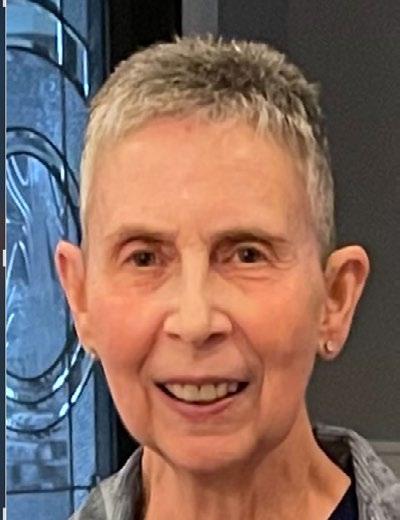
Forty years ago, one of my office nurses endeavored to “sell me” on my new neighbor who also happened to be one of our regular pharmaceutical reps. She said he was a nice guy and single. I was single and new to the area. The office staff liked me and wanted me to feel comfortable in my new digs. Dating apps didn’t exist, Ronald Reagan was president, and AIDS was the nascent scourge. Drug reps were omnipresent and had free access to our medication cabinet. RX insurance coverage didn’t exist, so both our patients, staff and physicians relied on the virtually nonstop supply of pharmaceutical samples. The drug reps were part of our office family. There was a never-ending supply of pens, notepads, and food. There were “mandatory” pseudo-educational presentations, but it was the supply of samples that stole the show.
Initially, my neighbor and I didn’t hit it off. I used his competitor’s product almost exclusively and proudly told him so. I had recently started dating someone else, so the matchmaking overtures were unsuccessful. By today’s standards, there were few prescription choices. There were no online search engines and we rarely referenced our clunky PDRs. Tylenol and aspirin were OTC, but Motrin, Anaprox, Monistat required office visits and prescriptions. Without pharmaceutical ads on TV, patients didn’t demand the latest and greatest drug. The availability of ultrasound was limited and advanced imaging was still in its infancy.
By now, you may have guessed that the saga of my neighbor, the drug rep, continued. His townhouse and my condo were separated by a tennis court.
Unbeknownst to the matchmaking office staff, we began playing tennis together. My first gift was a “Trinorinyl” pen that I cherished for years long after the ink ran out. Much to my chagrin, I learned that reps actually had serious education (and qualifying exams) for the medications that they “detailed”. I got roped in to “tutoring” my neighbor on cardiac physiology and anatomy to help him sell a new calcium channel blocker. I developed a newfound respect for the drug reps. I also developed a new office tradition and “demanded” that if the reps wanted my attention, they needed to bring lunch for the entire office staff from the nearby top-rated deli. This 30-minute lunch break in our conference room greatly improved office interactions and bonding.
Over the years, the number of new drugs and new drug classes exploded, along with more OTC options. The PDRs disappeared and online apps appeared. Some academic departments had their own clinical pharmacists who aided with study design and nuanced pharmaceutical options. Outpatient pharmacists became pill counters, benefit managers, and less so a knowledgeable reference for physicians and patients. TV ads proliferated. NSAID ads depicted patients suddenly able to run and dance. There was the bizarre Cialis ad with the couple seated in two bathtubs??? I wondered how many patients paid attention to the ads and pestered their physicians for specific prescriptions? I guess a lot, because the ads have proliferated. The jingles are so repetitive that many times I no longer even need to visualize the picture to identify the product anymore.
There are online companies like ro.co selling GLP1s and ED meds. The old drug rep games of rearranging their samples in the cabinet is being outdone by how “cute” the TV ad can be. Prior to writing this article, I surveyed friends for the “most disgusting” ad –the dancing Jardiance ladies won. An interesting side narrative is that all the diabetes ads show healthy, happy looking patients, albeit all overweight! Since I’ve dealt with inflammatory arthritis for over 25 years, I find the Voltaren and RA biologics ads very disingenuous as I haven’t been able to dance, run and jump anymore…least of all play tennis. It’s amazing how all the cancer patients are cured and look wonderful – not at all like the patients seated next to me in the infusion centers. I’m jealous of the heart failure patients who are out hiking again! I feel bad for current practitioners.I’m annoyed when an assistant or nurse fumbles through my long list of meds, mispronouncing them and not knowing why I take them. There’s no way to keep up with all the latest additions and interactions. I can only imagine how much time you spend responding to patient’s requests for medications that they have seen advertised on TV. On a positive note, there are now computer algorithms that instantly spot improper drug interactions. If only the prior authorization and step therapy requirements were streamlined… Oh – in case you wondered…that neighbor became my husband. He’s long since retired but when I’m asked how we met or what he did…I still answer, “he sold drugs”.

Physicians in Pennsylvania who are retired but wish to maintain an active license status for certain activities must follow specific guidelines for license renewal. The Pennsylvania State Board of Medicine oversees this process, ensuring retired physicians can continue to engage in limited medical activities while adhering to regulatory standards.
Requirements and Process Eligibility Criteria: Physicians must have held an active license in Pennsylvania previously and be in good standing with no pending disciplinary actions.
Application: Retired physicians must complete a license renewal application through the Pennsylvania Department of State's online portal or by mail. The application requires basic personal information and details about the physician's medical career.
Continuing Education: While a licensee with an active-retired license is exempt from the standard 100-credit hour CME requirement, an activeretired licensee is still required to complete the 2 credits of the child abuse recognition and reporting as well as 2 credits in pain management, identification of addiction, or the practice of prescribing or dispensing of opioids every license cycle. Licensees who do not have a DEA registration number or do not use the DEA registration of another individual or entity to prescribe controlled substances are exempted from the opioid education requirement.
Pennsylvania offers a pathway for retired physicians to maintain an active license status with limited
scope of practice. This enables retired healthcare professionals to continue contributing to public health initiatives while ensuring compliance with state licensing regulations. The process involves a straightforward application and renewal fee, allowing retired physicians to stay engaged in meaningful medical activities.
For detailed information and specific requirements, retired physicians should refer to the Pennsylvania State Board
of Medicine's official website or contact the licensing board directly at (717) 783-1400. PAMED and ACMS also have detailed license renewal information on their websites. The ACMS will be holding an in person Mandated Reporter training this summer – stay tuned for more details.
Further questions can be directed to Eileen Taylor, ACMS Manager – Member & Association Services, at etaylor@ acms.org or 412-321-5030 x105.
As we reflect on the past year's accomplishments and look toward the future, the Women in Healthcare Committee has proven to be a beacon of inspiration and progress. Since its establishment in May 2023, this committee has been dedicated to fostering a supportive environment for women physicians, advancing their leadership roles, and promoting their active participation in medicine. Let's take a closer look at the journey so far and the exciting initiatives on the horizon.
The journey of the Women in Healthcare Committee began with a resounding approval from the ACMS Board of Directors in May 2023. We were thrilled to take on the role of co-chairs of this committee and work alongside 15 passionate female physicians who opted into this committee. It was clear that this committee would set out to make a meaningful impact.
Since its inception, the committee has orchestrated a series of engaging events aimed at empowering women in healthcare. The Kick-Off Event held in August 2023 marked a momentous start, attracting over 65 women from various stages of their medical careers. Dr. Margaret Larkins-Pettigrew graced the occasion as the guest speaker, inspiring attendees with her insights and experiences. The event not only fostered networking but also garnered support from sponsors, laying a strong foundation for future endeavors.
The momentum continued with the Speed Networking and Wine Tasting event in February 2024, offering
a refreshing blend of professional networking and social interaction. With 45 registrants, the event exceeded expectations, thanks to the vibrant atmosphere curated by the Pittsburgh Winery. PNC Healthcare Banking's support played a pivotal role in making the event a success, underscoring the value of collaboration.
As we look ahead, the Women in Healthcare Committee is poised to embark on new initiatives that resonate with its core mission. The upcoming 2nd annual Summer Social promises to be an even grander affair, featuring Dr. Kristen Sandel, MD, PAMED’s 174th President, serving as this year's guest presenter. With registration already open, early sign-ups are encouraged so that registrants can secure their spot at this anticipated event.
Furthermore, discussions are underway for a Fall ½ day workshop, exploring avenues for mentoring opportunities and community involvement. The committee envisions this workshop as a platform for nurturing talent and fostering professional growth among women physicians. Additionally, there is talk of creating a scholarship or award, underscoring the committee's commitment to recognizing excellence and promoting advancement in the field.
The Women in Healthcare Committee isn't just about empowering women physicians; it's also about enriching the fabric of ACMS and its broader community. The committee's efforts have led to increased engagement and value for a specific cohort of physicians within the organization. Moreover, partnerships
with external organizations have opened doors to sponsorship opportunities, further amplifying the impact of the committee's initiatives.
Membership growth has been another significant outcome, with a noticeable uptick in renewals and new joins in female physicians attributed to the events organized by the committee. This serves as a testament to the compelling value proposition that the committee offers to a targeted segment of the membership base. Furthermore, collaborations with esteemed healthcare institutions like AHN and UPMC have garnered appreciation, highlighting ACMS's proactive stance in championing diversity and inclusivity in medicine.
In conclusion, the Women in Healthcare Committee's journey over the past year has been nothing short of remarkable. From inspiring events to visionary initiatives, the committee has demonstrated its unwavering commitment to advancing women in medicine. As we look to the future, there's a sense of anticipation and excitement, knowing that the best is yet to come. Together, let's continue to break barriers, shatter glass ceilings, and pave the way for a more inclusive and equitable healthcare landscape.
If you are interested in getting involved with the Women in Healthcare Committee please reach out to Nadine Popovich at npopovich@acms.org.
The Allegheny County Medical Society (ACMS) Board of Directors is proposing a change to the bylaws concerning the timing of elections for Officers and Delegates. The current bylaws stipulate that these elections are held in the first week of November. The proposed change seeks to move this timeframe to the first week of September. This adjustment aims to facilitate the certification of election results at the ACMS Board Meeting on the first Tuesday in September, taking advantage of electronic voting and allowing for Board continuity and a smooth board transition from year-toyear.
Members should submit any comments on these changes to ACMS Executive Director Sara Hussey (shussey@acms.org) or ACMS Bylaws Committee Chair and ACMS Secretary Kirsten Lin, MD (drlin@directcarepgh. com) by the end of the day on July 31, 2024. The Bylaws Committee will review any comments and will make necessary changes before bringing a final recommendation to the ACMS Board of Directors for approval.
Below is the bylaws change request:
ARTICLE VII
NOMINATIONS AND ELECTIONS
Section 1. Time of Election
The regular election of Officers and Delegates shall be held the first week in November September of each year.
Section 2. Officers and Delegates to be Elected
At each annual election the following Officers and Delegates shall be elected:
1. President-Elect
2. Secretary
3. Treasurer
4. Five members of the Board of Directors
5. One-half of the required number of Delegates to the Pennsylvania
Medical Society and one Alternate for every two Delegates
Section 3. Nominations of Candidates for Officers and Delegates
A Nominating Committee of five to seven members, appointed by the President and confirmed by the Board of Directors, will present a slate of candidates by August 1 September 1. The Committee may nominate more than the required number of candidates. Additional nominations of candidates may be made in writing prior to July 15 October 1. Nominations made in writing shall contain the written permission of the nominees.
Section 4. Publication of Nominations
All nominations for Officers and Delegates shall be made prior to August 1 October 1 and shall be distributed to the members of the Allegheny County Medical Society prior to the distribution of the ballots.
Section 5. Manner of Elections
1. The voting shall be by secret secure electronic ballot. Voting may be conducted by mail or electronic means The polls will close at 12:00 p.m. ten days one week after balloting begins or the next regular business day.
2. Mark the ballot for the designated number of Officers and Delegates in each category. A vote may be made for a candidate for any office whose name does not appear on the official ballot by writing his or her name in the appropriate space.
3. The results of the election shall be reported to the President and to the Secretary. The candidate receiving the plurality of votes shall fill the office. The Delegates and Alternate Delegates shall be listed in order of the votes received. Delegates and Alternate Delegates shall be elected as necessary to complete the full number of Delegates
to which the Society is entitled. Those candidates receiving the highest number of votes shall be considered elected until all places are filled.
• In the event of an increase in the number of authorized Delegates, the President shall appoint such additional Delegates as may be required. The appointments shall be made first from the list of candidates unsuccessful in the preceding election in order of the number of votes received. Additional appointments shall then be made from the list of Alternate Delegates in the order of the votes received. The list of the Alternate Delegates shall then be supplemented by appointment from the Society at-large.
• In the event of a reduction in the number of authorized Delegates, the appropriate number of Delegates shall be removed from the list of those elected beginning with the Delegate who received the smallest number of votes and continuing in order until the proper number of Delegates has been secured. The list of Alternate Delegates shall be reduced in a comparable manner.
4. No member may cast more than one vote for any candidate for any elective office.
5. Resolution of a tie vote – In the event of a tie between candidates for election to any office, the Board of Directors shall select the candidate to fill the office.
6. Publication of election results – The results of the election shall be published in the first issue of the BULLETIN of the Allegheny County Medical Society following the election.
Allegheny County Immunization Coalition (ACIC) — 2024 Chair - Ashley Ayers, MBA, BS, CIC: The Protect & Connect: First Annual Allegheny County Immunization Coalition
Happy Hour was a successful event held on May 10th from 4 pm to 6 pm at Kingfly Spirits in Pittsburgh. It provided a platform for networking among healthcare professionals and vaccination advocates, fostering connections and sharing insights. Attendees received updates on the ACIC’s immunization initiatives and emphasized collaboration through ecu and emphasized collaboration through educational and emphasized collaboration through ecu and emphasized collaboration through educational outreach opportunities. A highlight of the gathering was showcasing the data from the 20232024 grant cycle, with 20 attendees contributing to the event’s success.
Membership in the Allegheny County Immunization Coalition (ACIC) is free and open to all healthcare professionals interested in public health and immunization. This inclusivity ensures that a variety of professionals can contribute to and benefit from the coalition's initiatives and resources. The ability to offer free membership is made possible through grant funding, which supports the ACIC's mission without passing on costs to its members. This funding structure allows the coalition to focus on its goal of promoting immunizations and public health without financial barriers for participants. It's a great opportunity for healthcare professionals to engage in meaningful work to improve community
health outcomes.
To learn more about the ACIC:
1. Visit their website and join at www. ImmunizeAllegheny.org
2. Save the date for the 19th Annual Conference, “Guardians of Public Health: Strengthening Vaccine Confidence,” on November 8, 2024, at the Regional Learning Alliance in Cranberry, PA, from 7:30 am to 1:30 pm.
American College of Surgeons Southwestern Pennsylvania Chapter (ACS-SWPA) — 2024 President –Richard Fortunato, DO, FACS: On Wednesday, May 29, 2024, the Southwestern Pennsylvania Chapter of the American College of Surgeons held its annual Most Interesting Case Presentations. This gathering, held at Eddie Merlot's, brought together ACS-SWPA members, their guests, and students and residents from local programs for an evening of networking,
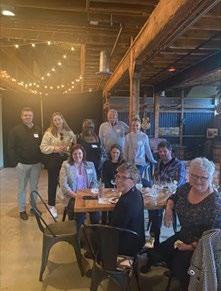
dinner, and spirited competition.
The event showcased intriguing case presentations from surgical residents at area training programs. Out of fifteen submissions, the top five were selected for discussion. The resident presenters were:
Christopher Sherry, DO, General Surgery Resident, Allegheny Health Network, presenting “Crystal Appendicitis: Gastrointestinal Complication Secondary to Sevelamer.”
Zihan Feng, MD, General Surgery Resident, UPMC Presbyterian, presenting “Gastropericardial Fistula: The Case of a Broken-Hearted Bypass.”
Bianca Blaettner, MD, General Surgery Resident, UPMC Mercy Hospital, presenting “Aortic Impingement from Thoracic Pedicle Screw.”
David Orozco, MD, General Surgery Resident, UPMC Mercy Hospital, presenting “Acute SBO Due to an Actively Bleeding Meckel’s Diverticulum.”
Evelyn Truong, MD, General Surgery Resident, UPMC Presbyterian, presenting “Urgent Multivisceral Transplantation in an Acutely Injured Patient: A Rare Solution to a Devastating Problem.”
Each presenter had 10 minutes to present their case and engage with the audience in a question-and-answer session. After the presentations, the audience voted live to determine the most interesting case. Evelyn Truong, MD, took 1st place; Bianca Blaettner, MD, was awarded 2nd place; and David Orozco, MD, earned 3rd place. Congratulations to Dr. Truong and all the presenters for their contributions!

Photo L to R: Richard Fortunato, MD, Chapter President, with presenters
David Orozco, MD, Zihan Feng, MD, Bianca Blaettner, MD, Christopher Sherry, MD and Evelyn Truong, MD
Pennsylvania Geriatric Society Western Division (PAGS-WD) — 2024
President - Heather Sakely, PharmD, BCPS, BCGP: The Pennsylvania Geriatrics Society – Western Division is excited to announce that nominations are being accepted for the 2024 Pennsylvania Geriatrics SocietyWestern Division (PAGS-WD) Geriatrics Teacher of the Year Award. The deadline has been extended through July 30, 2024. This annual award will honor both a physician and a healthcare professional who have made significant contributions to the education and training of learners in geriatrics and to the progress of geriatrics education across the health professions. If you know a remarkable geriatrics teacher who deserves this honor, please take a moment to submit a nomination. Your input can help us celebrate and acknowledge the dedication and impact
of our outstanding educators. You can find more details on our website and submit a nomination via the nomination form. Each nomination packet requires a nomination letter, the nominee’s updated curriculum vitae, and one or two letters of recommendation. Please direct any questions to Eileen Taylor at etaylor@acms.org.
in this evidence-based event aimed at improving care for the elderly. The conference also announced the winners of the David C. Martin Award, with details available on their website. Nominations for the Geriatric Teacher of the Year Award are open until May 17. For more society news and updates, visit www.pagswd.org
The Pittsburgh Ophthalmology Society (POS) — 2024 PresidentPamela P. Rath, MD: The Pittsburgh Ophthalmology Society (POS), led by President Pamela Rath, MD, held a productive board of directors meeting on May 1 to review the 2024 year in review and plan for the upcoming 2024-2025 Monthly Meeting Series. The officers and board members reaffirmed their strong commitment to advancing the field of ophthalmology through education, collaboration, and professional excellence. The meeting served to evaluate the processes of 2024 and strategize for the year ahead.
Key discussion points and highlights from the meeting included an overview of 2024 programming, membership
status, and financial reports. Notably, the monthly educational series, the annual meeting, and ophthalmic personnel meeting received positive feedback from members and attendees.
The board expressed optimism and enthusiasm for the upcoming year, confident that the planned initiatives and the continued dedication of its members will drive the success of the Pittsburgh Ophthalmology Society.
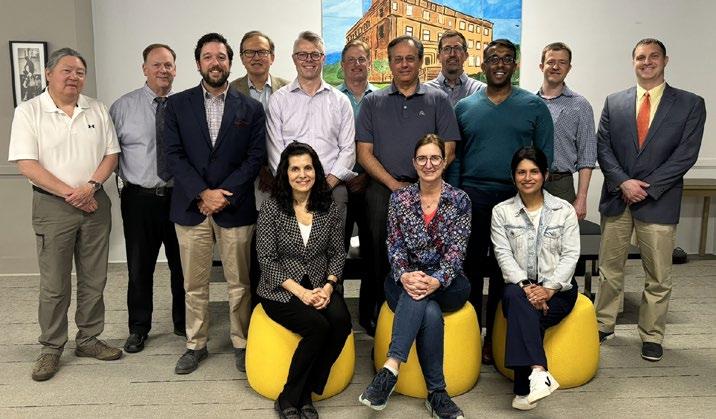
Row: Laurie Roba, MD (PresidentElect | Treasurer); Pamela Rath, MD (President); Avni Vyas, MD
Middle Row: Eric Pennock, MD; Jared Knickelbein, MD, PhD; Michael Azar, MD; Srinivas Kondapalli, MD
Back Row: Kenneth Cheng, MD; Joel Brown, MD (Secretary); Thierry Verstraeten, MD; Marshall Stafford, MD (Immediate Past President); Ian Conner, MD, PhD; Lance Bodily, MD; Jeffrey Wincko, MD


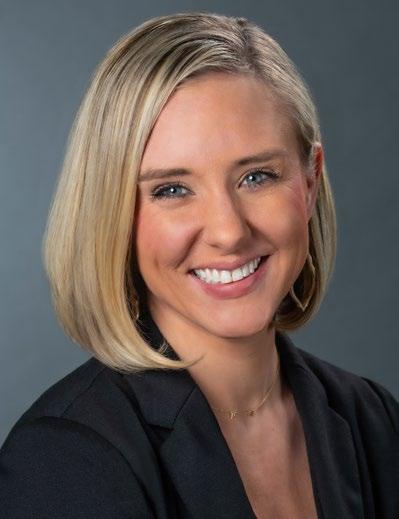
The Allegheny County Medical Society (ACMS) Distinguished Awards are a prestigious set of accolades recognizing outstanding contributions in the field of healthcare. After a hiatus, the awards have returned in 2024 with nominations open from June 1 to August 1. The winners will be celebrated at the ACMS Annual Meeting and Distinguished Awards Program on November 13, 2024, at the PNC Champions Club at Acrisure Stadium. More information about that event will be made available in the coming weeks.
The 2024 Awards Committee, comprised of Dr. Mark Goodman, Dr. Micah Jacobs, and Dr. Michael Aziz, have scaled down the awards categories to five awards, divided into two main categories: Community Awards and Physician Awards.
COMMUNITY AWARDS – THE BENJAMIN RUSH AWARDS
The Benjamin Rush Awards specifically recognize non-physician contributions to healthcare and community health. There are two categories for these awards:
• Benjamin Rush Individual Award: This award is given to a nonphysician individual who has dedicated time, skills, or resources to assist others and contribute to the advancement of healthcare. Recipients are recognized for their significant impact on public health and community welfare.
• Benjamin Rush Community Organization Award: This award recognizes an organization that addresses community health issues effectively. An example of a
recipient is the Greater Pittsburgh Community Food Bank, honored for its extensive efforts to provide food to those in need across southwestern Pennsylvania.
PHYSICIAN AWARDS
There are three categories of Physician Awards:
• The Nathaniel Bedford Primary Care Award honors a primary care physician who has demonstrated exceptional dedication to the physical and psychological needs of patients. This award is named after Dr. Nathaniel Bedford, who was a significant figure in the history of Pittsburgh's medical community. The award recognizes a physician who exemplifies several key qualities including exemplary patient care, clinical excellence, and a commitment to community service. An example of a recipient is Dr. Chris Allen, who was honored posthumously for his work in primary care and his role in establishing Shadyside Medical Associates. He was known for his dedication to patient care and his leadership within the UPMC system
• The Ralph C. Wilde Leadership Award recognizes a physician who demonstrates exceptional leadership in clinical care, education, and professional dedication. Named in honor of Dr. Ralph C. Wilde, a former president of ACMS known for his exemplary qualities as a physician, teacher, leader, and human being, this award celebrates those who embody those same attributes. Recipients of this award are recognized for
their outstanding commitment to advancing the field of medicine and serving as role models for other physicians. An example of a recipient is Dr. Richard L. Simmons, who was honored for his leadership in surgery and transplantation immunology, and his extensive contributions to medical education and patient care
• The Richard E. Deitrick Humanity in Medicine Award honors physicians who exemplify compassionate care, integrity, honesty, and respect for human dignity. This award aims to recognize those who have made significant improvements in the lives of their patients and serve as role models for other physicians. Recipients are acknowledged for their dedication to patient care and their positive impact on the medical community ACMS Members are encouraged to submit their nominations for these awards by August 1st via the Nomination form on the ACMS website at www.acms.org/membership/ distinguished-awards/. If you have questions, please reach out to Nadine Popovich at npopovich@acms.org.






